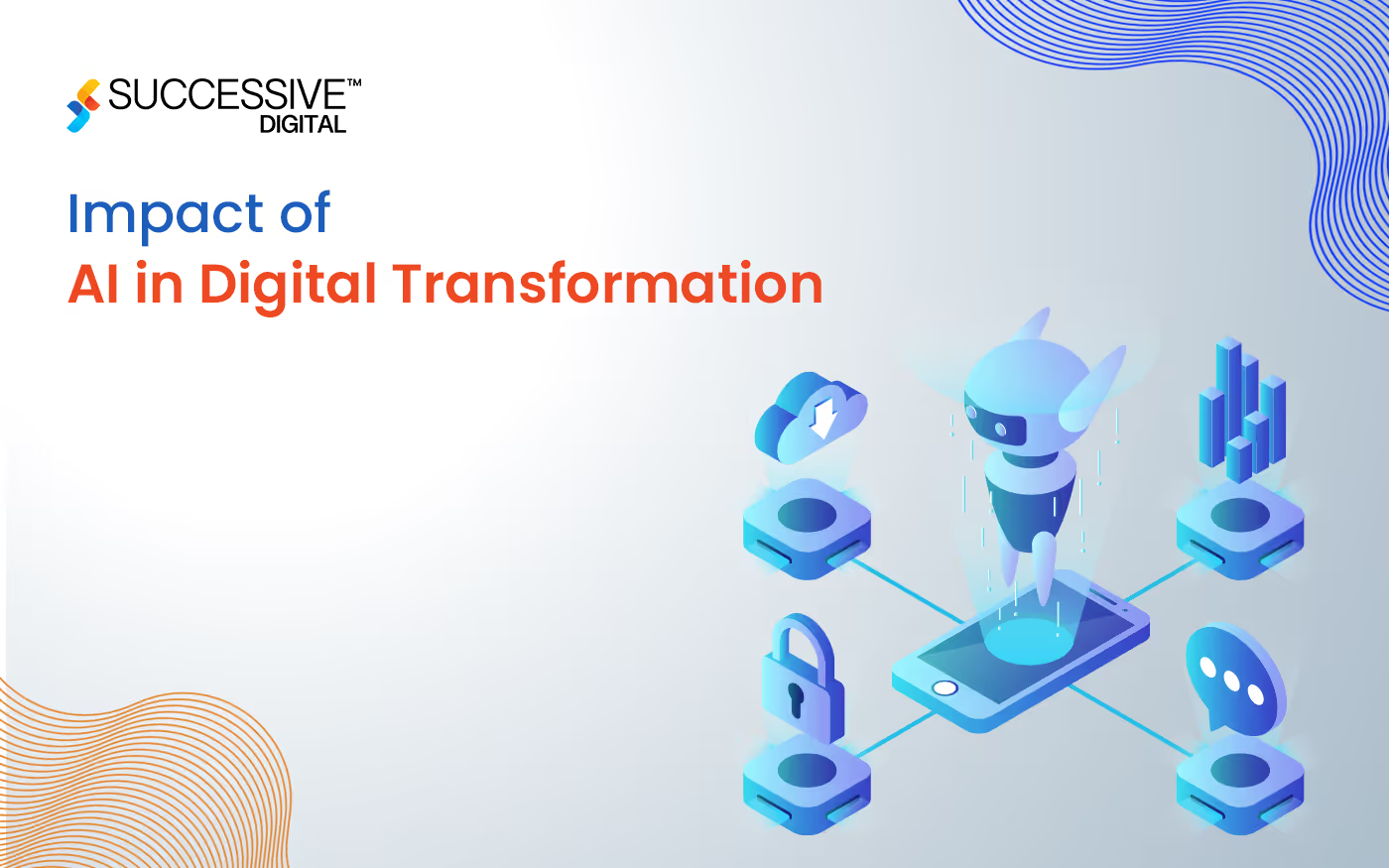In the wake of COVID-19, organizations across the globe have adopted digital technologies or switched to digital transformation initiatives to meet different strategic business goals. It’s good to see that 53% of organizations already have enterprise wide digital transformation strategies in place and others are planning to implement it from the core. These companies have already achieved an excellent level of business efficiencies and operational capabilities with digital technologies like mobile apps, web apps, cloud native applications, infrastructure modernization, IoT integrations, and others.Now, integrating AI in digital transformation strategies becomes a global discussion and companies are interested to explore AI within different business use-cases. Here the question comes as what new capabilities do the recent development in artificial intelligence and machine learning behold in their bucket for industries?At Successive, we have witnessed firsthand how AI is reshaping digital transformation strategies across industries. There are four major areas AI in digital transformation is creating lasting business impact; customer experience, business strategy, technology selection & integration, and organizational & culture change.In this blog post, we will explore the current state of digital transformation within organizations in the mentioned core areas and the journey companies can cover if are looking to move ahead with AI and ML integrations.
How AI Redefines Digital Transformation Practices Across Domains?
AI only stands for artificial intelligence, and it’s been there for many decades. It’s the recent development in the sub-section of machine learning such as multimodal AI, federated learning, explainable AI (XAI), reinforcement learning, generative adversarial networks (GANs), natural language processing (NLP) advancements, ethical AI, edge computing, transformer, and others, all poised to solve different business use-cases through AI based application modernization, product development, and data analytics.When implementing AI in digital transformation practices, it involves optimizing existing systems, process, and people for AI adoption and integrating AI solutions into existing systems so that companies can drive better efficiency and enhance decision-making.Examples of AI in digital transformation can be:
- Customer Experience Enhancements: Personalizing customer campaigns and services to create tailored and engaging interactions.
- Automation: Automating repetitive tasks and administrative processes, freeing up human resources for strategic activities.
- IT Systems Modernization: Revamping existing technologies and processes with AI-enabled code generation and automated testing.
- Improved Decision-Making: Leveraging advanced data analytics and predictive insights to make informed and proactive business decisions.
Let’s discuss the four pivotal AI levers driving digital transformation and redefining modern business models:
- Customer Experience
In customer experience, every company or organization has presales, sales, and post-sales customer journeys or customer interaction points. Digital transformation, though, has infused technologies within organizations like CRM, CMS, Big Data Analytics, Chatbots, Voicebots, Cloud solutions, and others; still, the traditional customer journey lacks personalization in customer-facing areas. Scaling of systems, interoperability and omnichannel experience as promised earlier is another challenge companies face in optimizing customer experience for the users. With AI supported systems, the promise of an exceptional customer journey can be fulfilled. Implementing artificial intelligence into the existing customer experience solutions can enhance outcomes in several ways, including:
- Companies can develop Personalized Recommendation systems that leverage predictive analytics to analyze customer preferences with sentiment analysis and help make informed predictions about forthcoming consumer behavior.
- Organizations can think of upgrading customer communication processes with Intelligent chatbots and virtual assistants that are build to provide human-centered service experiences. Top CX leaders hope for AI-powered bots that can streamline routine tasks and promote efficiency, all while delivering richer experiences to customers.
- Developing agent AI bots as central to the workforce experience alongside customer experience is another way to leverage AI in customer experience. Introducing AI in digital transformation has enabled companies to support their workforce with tools to access data and ensure an optimum experience for the customer by quickly tapping to data they need to deliver engaging and exceptional customer experience.
For example, AI-powered recommendation systems used by companies like Netflix and Amazon analyze user preferences to suggest tailored products or content. This level of personalization not only boosts engagement but also drives significant revenue growth, with businesses reporting up to 10-30% higher sales through AI-enhanced customer experiences.Ready to transform your business with AI-powered solutions? Discover how AI can enhance your digital transformation journey, optimize operations, and deliver exceptional customer experiences. Contact our experts today to get started!
- Business Strategy
Digital transformation brought technological advancements in day-to-day business operations by modernizing existing applications and infrastructure of organizations with cloud and big data management solutions. Industries like healthcare, finance, insurance, manufacturing, and others have leveraged digital technologies and collected vast amounts of data. These companies leveraged the data and transformed their business strategy practices into data-driven processes. Over a period of time, such capabilities came to a stalemate as data processing or generating insights to the required extent was not possible with the available systems or solutions. Bringing AIin digital transformation as part of business strategy and implementation has vast potential to generate new revenue streams for organizations. Key Advantages of AI in business strategy
- Personalized Marketing
- Customer Service Automation
- Predictive Analytics
- Content Optimization
- Social Media Management
- Lead Generation
- Search Engine Optimization
Advanced Use Cases of AI in Business StrategyBeyond conventional benefits, AI empowers businesses to tackle highly technical challenges and unlock deeper insights by leveraging sophisticated models. These advanced use cases include:
- Dynamic Pricing
- Fraud Detection
- Anomaly Detection
- Predictive Maintenance
- Advanced Customer Segmentation
- Algorithmic Trading Strategies
- Drug Discovery & Molecular Design
- Machine Learning-Based Route Planning
- Technology
Digital transformation has fundamentally reshaped how companies adopt and integrate technologies to stay competitive. This shift includes embracing cloud computing, mobile apps, data analytics, IoT, and more. Organizations have moved from traditional waterfall models to agile and DevOps-based approaches, enabling faster responses to market disruptions and ensuring operational agility.AI's integration into digital transformation introduces a paradigm shift from rule-based automation to cognition-based automation, particularly within CI/CD pipelines. Unlike traditional automation, cognition-based automation leverages AI and machine learning models to make dynamic, context-aware decisions. For example, AI-infused CI/CD pipelines can:
- Predict potential deployment failures by analyzing historical data and pipeline metrics.
- Automatically optimize code testing and deployment workflows, improving efficiency and reducing errors.
- Enable continuous learning from feedback to refine processes over time, enhancing pipeline robustness.
Organizations already operating with cloud-based infrastructure and DevOps practices are well-positioned to implement AI-driven enhancements. They can leverage platforms like AWS SageMaker or AWS Bedrock to integrate cognitive capabilities into their development and deployment pipelines rapidly. Having cloud and DevOps supported CI/CD pipelines not only help introduce automation within it and save time of manual efforts, but also power up additional strategic and technical supports companies require to integrate AI as additional layer of solutions over existing infrastructure or applications.
Infrastructure Optimization
AI requires robust infrastructure to support machine learning models, manage model lifecycles, and handle training data. With cloud platforms such as AWS, Azure, and Google Cloud, organizations can scale their resources as needed, enabling instant project launches.
Model Lifecycle Management
AI models must be accurate, transparent, explainable, and auditable. Cloud platforms offer tools to manage these lifecycle needs seamlessly, ensuring continuous learning and adaptation.
Data Utilization
Cloud-native AI frameworks facilitate the processing, storage, and analysis of vast data sets at lower costs, unlocking insights that drive business value.
Visualizations and Libraries
Pre-built AI libraries and visualization tools accelerate development cycles and empower teams to deliver impactful applications.
Advancing with Cognition-Based Automation
By transitioning from static, rule-based automation to cognition-based systems, businesses can unlock new efficiencies and decision-making capabilities. This evolution allows for:
- Enhanced adaptability to changing environments and requirements.
- Proactive identification and resolution of operational bottlenecks.
- Scalability and flexibility to align with evolving business goals.
The convergence of AI and digital transformation enables organizations to achieve innovation at scale while maintaining cost efficiency. This technology-driven approach is not just an operational advantage—it’s a strategic imperative for thriving in an increasingly competitive marketplace.
- Organization & Culture
Beyond technology and infrastructure, digital transformation heavily relies on the culture of an organization. Not every company has had a culture of innovation for digital transformation, but when hit by COVID-19, companies realized its long-term significance. Different stakeholders within the organization realized the importance of interconnected data access and communication. Just like that, organizations are required to first develop a growth mindset to implement AI within existing solutions, processes, and systems. They need to realize the benefits of AI, such as cross-functional collaboration and data-driven insights, to make faster and smarter decisions. This approach can help companies to fully embrace AI and cloud technologies and position themselves as digital innovation leaders.

With improved data sharing, workflows, and real-time insights, AI can help different teams within a company collaborate and make decisions more agilely and effectively.Wrapping Up Digital transformation firms leverage AI to offer data-driven insights and solutions to their clients. AI tools help analyze client data to identify inefficiencies, market opportunities, and areas for improvement. This approach enables consultants to provide tailored strategies that align with their client's unique challenges and objectives, ensuring successful digital transformation outcomes.As AI has emerged as a transformative force in digital transformation, businesses are leveraging dynamic tools to innovate, optimize operations, and enhance customer experiences. By strategically integrating AI into your digital transformation initiatives, organizations can achieve sustainable growth and maintain a competitive edge in the digital age.
.avif)

.webp)



.webp)














